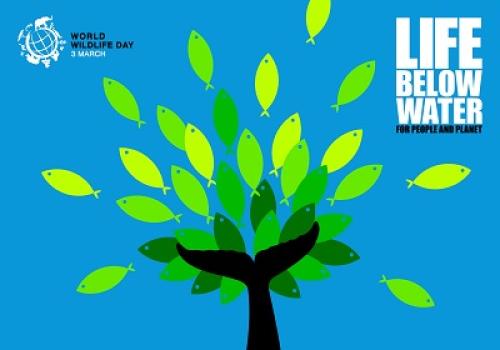Today, 3rd March 2019, is the World Wildlife Day and we join the rest of the world in commemorating this important day. This year, World Wildlife Day will be celebrated under the theme “Life below water: for people and planet", which aligns with goal 14 of UN Sustainable Development Goals[i] as well as Target 11 of the Aichi Biodiversity Targets.
The SADC region is endowed with a diverse range of freshwater and marine biodiversity. While significant strides have been made to safeguard these resources that contribute significantly to the socio-economic well-being of the Member States and local communities, challenges abound to human induced factors such as pollution, unregulated harvesting and illegal trade. Unregulated harvesting of marine resources leads to over exploitation to a point where some marine species fail to self-replenish and are often driven to the brink of extinction. The South West Indian Ocean (SWIO) sub-region of SADC loses between US$200million and US$500 million annually to illegal, unregulated and unreported (IUU) fishing.
Unsustainable and destructive fishing methods, as well as by-catch can also result in negative ecosystem impacts that affects the ecosystem’s balanced aquatic life, habitats such as coral reefs, mangroves, sea grass beds and sea bottom substrate and its biodiversity. By-catch includes important non-targeted commercial fish stocks, juveniles and endangered, threatened and protected (ETP) species such as marine turtles, marine mammals, sea birds, sharks etc. All of these have socio-economic implications on food security and livelihoods of the local fishing communities in the SADC region.
The degradation of coastal habitats and realities of marine pollution are becoming more apparent. Marine pollution comes in many forms, which include oil, plastic, industrial and agricultural wastes and chemicals, but the largest factor affecting the aquatic and marine environment is plastic. Over the last decade, we have produced more plastic than we have in the last 100 years. This sharp increase in plastic entering our waters harms not only marine life but also humanity.
The impacts from climate change on regional habitats, species and community needs are still not fully understood, but it is clear that significant changes in local weather patterns, runoff and sea level rise will threaten critical marine ecosystems including key breeding, nursery and feeding grounds for marine wildlife, affecting recruitment, abundance and occurrence.
It is a fact that marine wildlife plays a crucial role on life on the planet such as being a source of food. The oceans themselves have profound effect on global climate trends and other ecosystems functions such as carbon sink and repository of waste materials on the globe. The quality of marine environment needs to be managed and that applies as well to the sustainable utilisation of the marine resources.
SADC Member States are, therefore, called upon to take a leading role in implementing actions both at national and regional level that safeguard water bodies and the life below it. It is a call for action to ensure that these water bodies are not overly polluted, reduced to open access but are instead sustainably utilized to enable them to self-regulate and replenish for the benefit of the present and future generations. Through effective and collaborate implementation of national laws and international conventions including the various SADC Protocols and Strategies such as the SADC Protocol on Wildlife Conservation and Law Enforcement, Protocol on Fisheries and Protocol on Shared Watercourses, Regional Green Economy Strategy and Action Plan, Regional and the Biodiversity Strategy and Action Plan, the region will ensure that the ecosystem functions are not disturbed beyond limits of self-replenishment and that the quality of marine and fresh water life in the region is also sustained.
In celebrating the United Nations World Wildlife Day, let us indeed celebrate the successful initiatives undertaken to conserve and sustainably manage the marine and freshwater species as we scale up actions that safeguard the marine environment and freshwater ecosystems. It begins with all of us.
[i] SDG Goal 14: Conserve and sustainably use the oceans, seas and marine resources for sustainable development.

